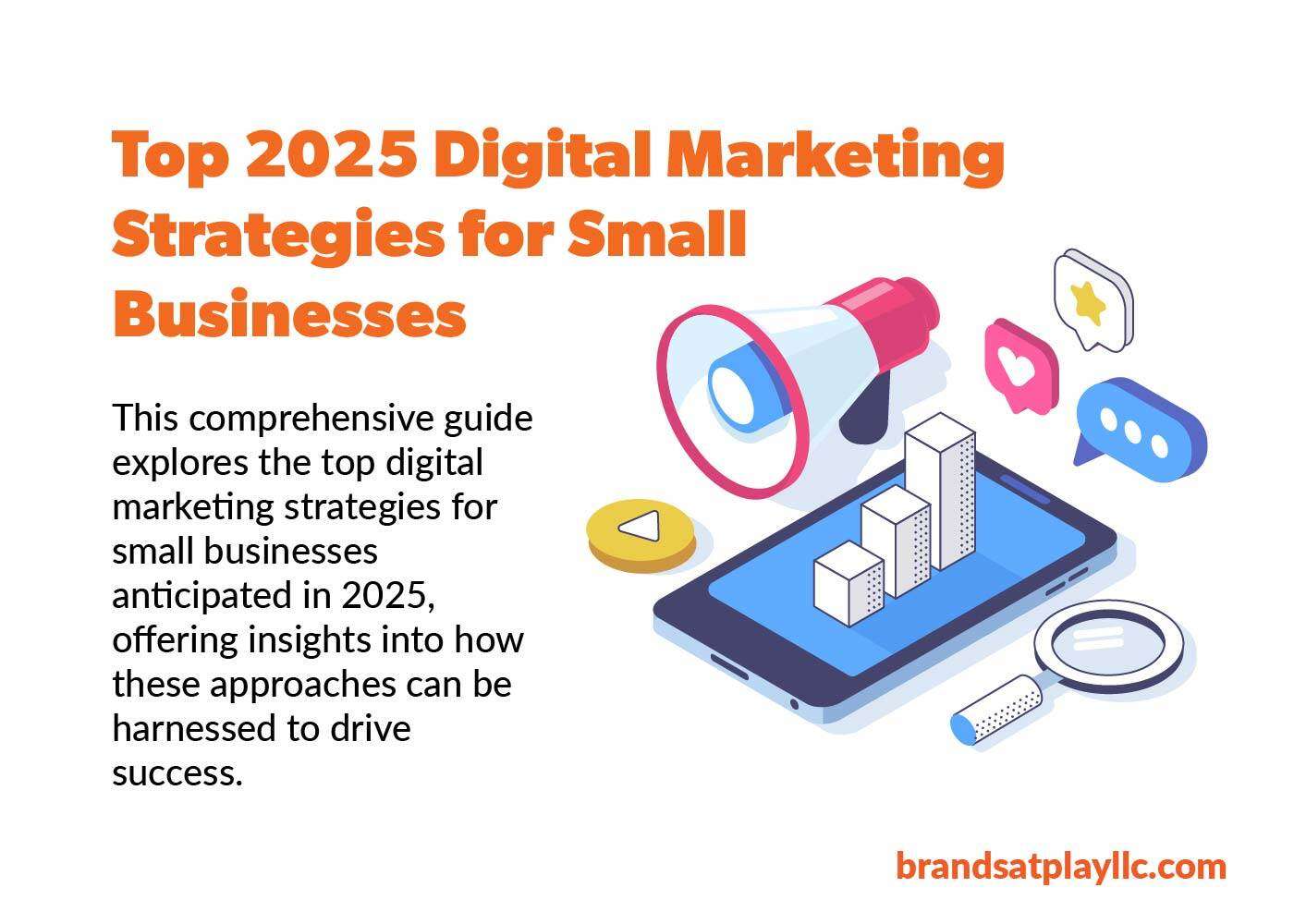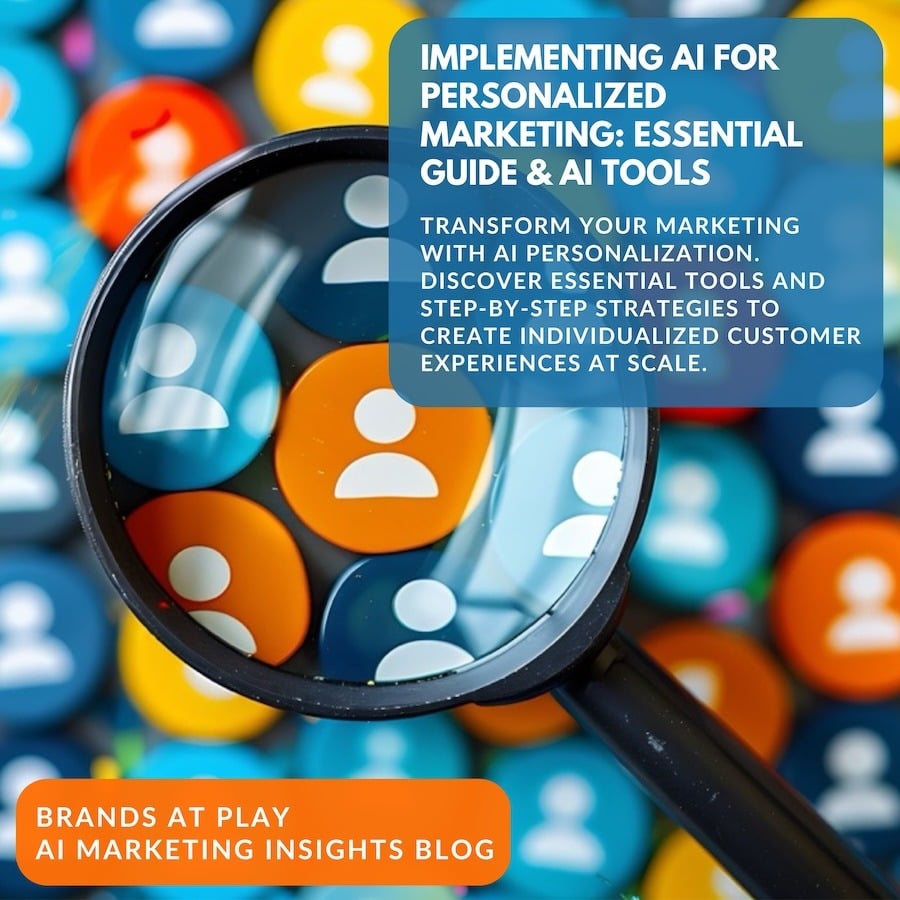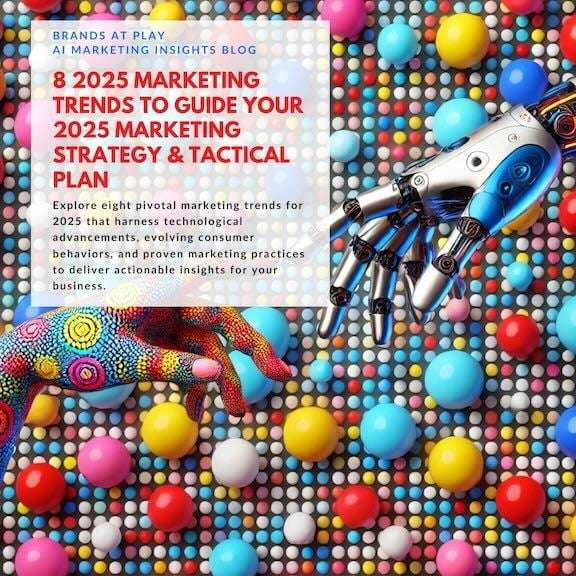9 min read
Top 2025 Small Business Digital Marketing Strategies for Growth & ROI
Stephanie Unterweger : Feb 15, 2025 12:00:00 AM

In the digital age, where 70% of small businesses say online marketing is crucial for growth, staying relevant and competitive requires constant adaptation. Many small business owners and digital marketers are asking themselves, "What digital marketing trends should I follow in 2025?"
In 2025, digital marketing is an exhilarating and ever-evolving arena, presenting both opportunities and challenges that necessitate forward-thinking marketing strategies and budgeting. This also requires adopting new methods for time and resource allocation, with an increased reliance on AI, automation tools, and emerging technologies. For small business owners, digital marketers, and entrepreneurs, understanding and implementing the right strategies is crucial for sustainable growth. This comprehensive guide explores the top small business digital marketing strategies in 2025, offering insights into how these approaches can be harnessed to drive success.
Understanding the 2025 Digital Marketing Landscape
With rapid technological advancements and shifts in consumer behavior, the digital landscape is evolving like never before. Key trends include increased reliance on artificial intelligence (AI), heightened expectations for personalization, and the rise of immersive technologies. These changes necessitate a proactive approach, where businesses adapt their marketing strategies to remain relevant and effective.
Digital marketing plays a pivotal role in navigating these changes. By leveraging the latest tools and techniques, businesses can connect with their target audiences more effectively, deliver personalized experiences, and drive engagement. Staying ahead of these trends will be essential for small businesses looking to thrive in the competitive market.
AI and Automation Have an Impact Everywhere
Artificial intelligence and marketing automation have revolutionized the way small businesses function, enhancing their ability to increase efficiency and compete with larger companies. By optimizing processes and handling routine tasks, these technologies free up time, enabling business owners to concentrate on essential growth activities. In marketing, these innovations streamline efforts, boost efficiency, cut costs, and enhance results. AI-powered tools can process extensive data, provide insights, and automate repetitive tasks, freeing up valuable time for marketers.
The impact of AI in marketing is profound. According to a study by the U.S. Chamber of Commerce, nearly one in four small businesses have adopted AI, citing enhanced performance in marketing and communications. From generative AI for content creation to CRM platforms with automation capabilities, AI is revolutionizing how businesses operate.
Leading AI-powered marketing tools such as HubSpot, Salesforce, Jasper, and ChatGPT offer AI-driven marketing solutions that empower businesses to optimize their efforts. These platforms provide a range of features, from content generation and data analytics to customer relationship management, enabling small businesses to achieve remarkable results.
Guidance for Small Businesses on Exploring and Implementing AI and Automation:
-
Partner with an Expert: Consider partnering with an AI and Marketing Automation Strategy agency like Brands at Play to guide you through the AI adoption and integration to maximize results.
-
Set Clear Marketing Goals: Define what you want to achieve with marketing automation, like boosting engagement or improving service.
-
Identify AI Benefits: Look for specific ways AI can enhance your marketing, such as personalizing customer interactions or improving campaign targeting.
-
Assess Your Team’s Skills: Evaluate your team's capabilities and any barriers, like resistance to change. Ensure you have the right resources for AI integration.
-
Choose the Right Tools: Select automation tools that match your business needs. Consider their features, ease of use, support, pricing, and scalability.
-
Train Your Team: Invest in user-friendly tools and comprehensive training to help your team adapt and maximize productivity.
-
Start Small: Begin with one campaign to minimize risk and build confidence. Expand gradually as you get comfortable.
-
Track Performance: Monitor key metrics to assess your automation's success and adjust strategies as needed.
-
Scale Up Gradually: As you gain confidence, gradually expand automation across more areas of your marketing. Use a phased approach for smooth transitions.
Targeting the Right Audience with Personalization
Personalized marketing is a defining strategy in 2025. Consumers increasingly expect tailored experiences that resonate with their unique preferences and needs. By harnessing customer data, businesses can create personalized campaigns that drive engagement and foster brand loyalty.
Strategies for effective personalization include gathering data through various channels, such as website interactions and social media engagements. Analyzing this data allows businesses to segment their audience, delivering targeted messages that resonate with specific groups. This approach not only enhances the customer experience but also increases conversion rates.
The benefits of personalized marketing extend beyond engagement. According to IBM, extensive personalization using the next best action can increase average revenue per user by 166%. By prioritizing personalization, small businesses can gain a competitive edge and build lasting customer relationships.
Steps to Enhance Customer Engagement Through AI-Driven Personalized Marketing:
-
Utilize AI-driven analytics tools to gather and analyze customer data, enabling precise audience segmentation.
-
Implement marketing automation platforms to streamline email campaigns, ensuring timely and relevant communication with personalized content.
-
Leverage machine learning algorithms to predict customer behavior and preferences, allowing for dynamic content delivery in real-time.
-
Continuously refine strategies based on performance metrics to enhance personalization efforts and maximize customer engagement.
By integrating these AI-driven personalization strategies, businesses can enhance customer relationships, increase brand loyalty, and drive higher engagement and conversions in 2025.
Leveraging Content Marketing for Engagement
Content marketing remains a powerful tool for engaging audiences in 2025. Creating high-value, engaging content across various platforms is essential for capturing attention and driving meaningful interactions. From blog posts and videos to infographics and podcasts, diverse content formats cater to different audience preferences.
AI tools play an increasing role in content marketing, enabling the generation of personalized, high-quality content at scale. By analyzing user behavior, AI tools create hyper-targeted messaging that drives deeper engagement and higher conversion rates.
Interactive and immersive content, such as quizzes, polls, augmented reality (AR), and virtual reality (VR), continues to gain traction, offering unique experiences that enhance engagement. The power of storytelling should not be underestimated; crafting narratives that resonate with your audience fosters emotional connections and enhances brand loyalty.
Additionally, content atomization is key, as brands repurpose long-form content like whitepapers and webinars into micro-content, such as social media snippets and infographics, to reach a broader audience efficiently. User-generated content (UGC) also plays a significant role in content strategies, with brands leveraging authentic customer stories and testimonials to build trust and community.
To maximize the impact of content marketing, businesses should focus on consistency and relevancy. Regularly publishing valuable content keeps your audience informed and engaged, positioning your brand as a thought leader in your industry. By providing solutions to common challenges, your content becomes a valuable resource for your audience.
Steps for Small Businesses to Optimize Content Marketing in 2025 for Customer Engagement:
-
Leverage AI Tools: Utilize AI technologies to analyze customer behavior patterns and preferences, enabling the creation of highly personalized content that resonates with individual users.
-
Diversify Content Formats: Provide a variety of content types—such as blog posts, videos, infographics, and podcasts—to cater to different audience preferences and increase engagement.
-
Create Interactive Content: Boost user engagement by designing interactive experiences like quizzes, polls, augmented reality (AR), and virtual reality (VR) that encourage participation and exploration.
-
Focus on Storytelling: Craft compelling narratives that evoke emotions and create connections, making your brand's message more relatable and memorable to your audience.
-
Implement Content Atomization: Break down lengthy articles and reports into smaller, digestible pieces, allowing for easier consumption and greater reach across different platforms.
-
Encourage User-Generated Content: Motivate your customers to share their own stories, experiences, and testimonials, fostering a sense of community and trust around your brand.
-
Maintain Consistency: Develop a regular publishing schedule for valuable content that keeps your audience engaged and looking forward to your updates over time.
-
Ensure Relevancy: Focus on addressing common challenges faced by your audience and provide practical solutions, positioning your brand as a trusted authority in your field.
Embrace Omnichannel Marketing for Seamless Customer Experiences
Omnichannel marketing is the future of customer engagement. By integrating multiple channels seamlessly, businesses provide a consistent and cohesive experience for their audience. Whether it's social media, email, or in-store interactions, customers expect a unified brand experience across all touchpoints.
The benefits of omnichannel marketing are significant. It enhances customer satisfaction, increases retention rates, and boosts sales. By delivering personalized content and promotions through various channels, businesses can reach their audience at the right time and place.
To succeed with omnichannel marketing, businesses should focus on data integration and customer segmentation. By understanding customer behavior and preferences, businesses can tailor their messages to meet individual needs. This approach creates a seamless experience that fosters brand loyalty and drives long-term success.
How Small Businesses Can Create a Consistent Brand Experience with Omnichannel Marketing:
-
Define Your Brand Voice and Visuals: Ensure your brand's messaging, tone, and visuals are consistent across all channels, including social media, email, and physical stores.
-
Utilize Customer Data: Gather and analyze customer data from various touchpoints to understand preferences and behaviors, allowing for targeted marketing efforts.
-
Create a Unified Customer Journey: Map out the customer journey across channels and ensure that each interaction reinforces the same brand message and experience.
-
Train Your Team: Educate your staff on the importance of omnichannel marketing and equip them with the tools and knowledge to provide a consistent experience across all customer interactions.
Voice and Visual Search: Meeting Consumer Expectations for Convenience and Speed
As technology advances, consumer expectations continue to rise. Voice search and visual search are transforming how people find information online. In 2025, refining SEO strategies and optimizing content for these new search trends is crucial for maintaining search engine visibility.
Voice search is gaining traction. With the increasing use of smart speakers and voice assistants, more consumers rely on voice commands to conduct searches. To optimize for voice search, businesses should focus on conversational keywords and natural language.
Visual search is another emerging trend. Platforms like Google Lens and Pinterest enable users to search using images, offering a new way to discover products and services. By optimizing images with relevant alt text and metadata, businesses can improve their chances of appearing in visual search results.
Top SEO Strategies for Small Businesses to Master Voice and Visual Search:
-
Incorporate conversational keywords and phrases into your content to align with how customers speak.
-
Create FAQ sections on your website that address common queries in natural language.
-
Use high-quality images and include descriptive alt text and metadata to enhance visual search visibility.
-
Ensure your website is mobile-friendly and loads quickly, as many voice and visual searches are conducted on mobile devices.
By integrating these SEO strategies, small businesses can enhance search rankings, improve discoverability, and stay ahead of emerging search trends in 2025.
Effective Email Marketing for Building and Nurturing Customer Relationships
If you're wondering, "Is email marketing still effective?" The answer is yes—it remains a powerful tool for nurturing customer relationships in 2025. Email marketing has evolved significantly, transforming into a highly advanced and targeted approach, empowered by sophisticated analytics, precise segmentation, and robust automation capabilities of modern technology. With the right strategies, businesses can deliver personalized messages that resonate with their audience, driving engagement and conversions.
Best practices for email marketing in 2025 include segmenting your audience, crafting compelling subject lines, and delivering relevant content. By tailoring your messages to different customer segments, you can provide value and encourage interaction.
Creating and sustaining a reliable, precise, and legally compliant email list is crucial. By collecting data from various touchpoints, businesses can create targeted campaigns that address specific customer needs. Email marketing capabilities paired with analytics and automation enhance the impact of campaigns, ensuring maximum effectiveness.
Top Email Marketing Strategies for Small Businesses to Build Strong Customer Relationships:
-
Build a Strong, Compliant Email List: Ensure your email list consists only of members who have opted in and given consent to receive communications. This is crucial for maintaining trust and adhering to legal requirements.
-
Leverage AI for Personalization: Use AI tools like Mailchimp or HubSpot to analyze customer data and craft personalized email content that resonates with different segments of your audience.
-
Implement Marketing Automation: Utilize automation platforms like ActiveCampaign or Constant Contact to streamline your email campaigns, ensuring timely follow-ups and responses based on customer interactions.
-
Segment Your Email List: Regularly review and refine your email list to create segmented groups based on customer behavior, preferences, and purchase history, allowing for more targeted messaging.
-
Monitor and Analyze Performance: Use analytics tools within your email marketing platform to track open rates, click-through rates, and engagement metrics, allowing you to adjust strategies as needed for better results.
By integrating these email marketing strategies, small businesses can build strong customer relationships, increase brand loyalty, and drive higher engagement in 2025.
Top Social Media Strategies for Small Business Growth in 2025
Social media continues to play a vital role in digital marketing, and in 2025, staying ahead of key social media trends is essential for small businesses aiming to reach and engage their target audience. With the rise of AI-driven tools, personalized content, and short-form videos, businesses must leverage different platforms effectively to build brand awareness and drive conversions.
To succeed on social media in 2025, businesses should focus on authenticity, engagement, and personalization. AI-powered algorithms and tools help small businesses tailor content to individual preferences, creating more personalized experiences. Sharing valuable content—such as short videos, polls, and live streaming—while actively engaging with followers fosters deeper connections and builds a loyal community of brand advocates.
The evolving role of social media marketing in digital marketing highlights the importance of adapting to emerging platforms and trends. New social media features, such as shoppable content, AR filters, and voice-powered interactions, create fresh opportunities to engage audiences. By staying agile and embracing these advancements, businesses that prioritize video marketing, influencer partnerships, and community building stand out and drive higher engagement and conversions.
By integrating these 2025 social media strategies, small businesses can stay competitive and thrive in the ever-changing digital landscape.
Top Strategies for Small Businesses to Improve Social Media Presence in 2025:
-
Embrace AI Tools: Utilize AI-driven tools like Hootsuite, Talkwalker, or Sprout Social to analyze audience behavior and optimize content strategy.
-
Implement Marketing Automation: Leverage automation platforms like Buffer or Later to schedule posts and streamline social media management, ensuring consistent engagement.
-
Engage with Video Content: Create engaging video content using tools like Pictory to capitalize on the growing popularity of video content across social platforms.
-
Monitor Trends: Stay updated with trends using tools like BuzzSumo or Google Trends to identify what resonates with your audience and adapt your strategies accordingly.
By embracing these social media strategies, small businesses can enhance brand presence, engagement, and growth in 2025.
How Small Businesses Can Measure Digital Marketing Success with Analytics and KPIs
Data-driven decision-making is paramount in 2025. To gauge the success of your digital marketing campaigns, businesses must rely on analytics and key performance indicators (KPIs). These metrics provide valuable insights into audience behavior, campaign performance, and overall ROI.
Essential KPIs for tracking digital marketing success include website traffic, conversion rates, customer acquisition cost, and customer lifetime value. By monitoring these metrics, businesses can identify areas for improvement and optimize their strategies accordingly.
Analytics tools provide valuable data that enables businesses to make informed decisions. By analyzing trends and patterns, businesses can refine their marketing efforts and achieve sustainable growth.
Top Steps for Small Businesses to Track Digital Marketing Performance with KPIs and Analytics:
-
Set Clear Goals: Define specific marketing objectives that align with your business goals, making it easier to identify relevant KPIs.
-
Utilize AI and Marketing Automation: Incorporate AI tools like HubSpot and Adobe Marketo to automate data collection and analysis, allowing for real-time insights and more efficient marketing workflows.
-
Track Performance with Popular Tools: Use platforms such as Google Analytics and SEMrush to monitor website traffic, engagement metrics, and SEO performance effectively.
-
Regularly Review and Adjust Strategies: Schedule monthly or quarterly reviews of your KPIs to assess performance, adjust strategies, and leverage AI-driven insights for continuous improvement.
Conclusion
The digital marketing landscape for small businesses in 2025 is full of opportunities for growth and success. By understanding and implementing the top strategies outlined in this guide, businesses can stay ahead of the competition and achieve remarkable results. At Brands at Play, we are committed to helping businesses thrive in the digital age. Schedule a FREE consultation with us today to discuss your 2025 digital marketing strategy and unlock your business's full potential.
What 2025 digital marketing trend do you think will most significantly influence small businesses, and why?
Share your insights in the comments below, or discuss how 2025 marketing trends and AI and automation advancements will shape your marketing strategy.

What is Personalized Marketing? - The 2025 Guide for CMOs & Marketers
According to Salesforce's State of the Connected Customer Report, 73% of consumers expect companies to understand their unique needs and...

12 min read
The Ultimate Guide to AI Marketing Automation in 2025
Introduction to AI Marketing Automation According to HubSpot, a robust marketing strategy is the cornerstone of any successful business...









